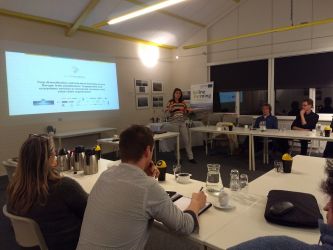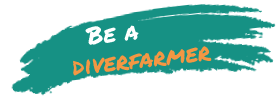The Dutch Diverfarming team and the farmers of the zone discuss the first results of the crop diversification
A team of 21 people, made up of 18 farmhands and three researchers from the Diverfarming project, exchanged opinions and experiences regarding the results obtained from the sampling of the Dutch case studies, in a meeting held in Groningen (Netherlands).
 Following the first year of diversification, the research personnel from the University of Wageningen (Netherlands) carried out a sampling of soils and the crop to know, through the use of biologicalparameters,the benefits that crop diversification and low-input management practices present with respect to thetraditional monocropping.
Following the first year of diversification, the research personnel from the University of Wageningen (Netherlands) carried out a sampling of soils and the crop to know, through the use of biologicalparameters,the benefits that crop diversification and low-input management practices present with respect to thetraditional monocropping.
The results of this sampling revealed how the systems with biological practices and diversification promote the soil to capture more organiccarbon and that the soil biodiversity increases, as shown by the increase in earthworms. These indicators are proof of better soil health in these systems in both the study of the long-term diversification case study (potato crop) as well as in the case study initiated with the project involving diversifications in maize with beans. This latter combination, carried out in the same line, promotes a greater protein content in the harvest. Meanwhile, in the long-term case study it is seen how diversified rotation promotes better soil quality than no rotation or rotation with only one type of crop.
In the forthcoming year, the trials with diversification treatments will continue and, in conjunction with the farmers, decisions will be taken regarding which treatments to implement, with emphasis being placed on crop rotation and diversity.
Diverfarming is a project financed by the Horizon 2020 Programme of the European Commission, within the challenge of “Food Security, Sustainable Agriculture and Forestry, Marine, Maritime and Inland Water Research and the Bioeconomy”, which counts on the participation of the Universities of Cartagena and Córdoba (Spain), Tuscia (Italy), Exeter and Portsmouth (United Kingdom), Wageningen (Netherlands), Trier (Germany), Pecs (Hungary) and ETH Zurich (Switzerland), the research centres Consiglio per la ricerca in agricoltura e l'analisi dell'economia agraria (Italy), the Consejo Superior de Investigaciones Científicas (Spain) and the Natural Resources Institute LUKE (Finland), the agrarian organisation ASAJA, and the companies Casalasco and Barilla (Italy), Arento, Disfrimur Logística and Industrias David (Spain), Nieuw Bromo Van Tilburg and Ekoboerdeij de Lingehof (Netherlands), Weingut Dr. Frey (Germany), Nedel-Market KFT and Gere (Hungary) and Paavolan Kotijuustola and Polven Juustola (Finland)).










